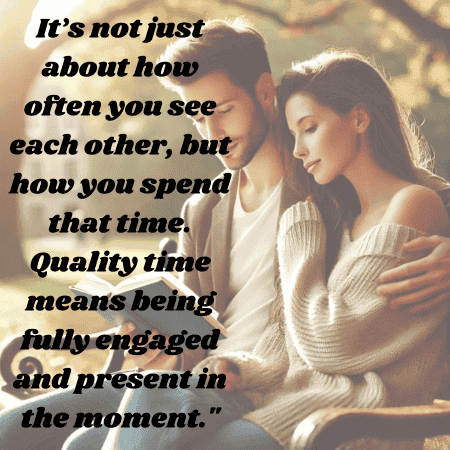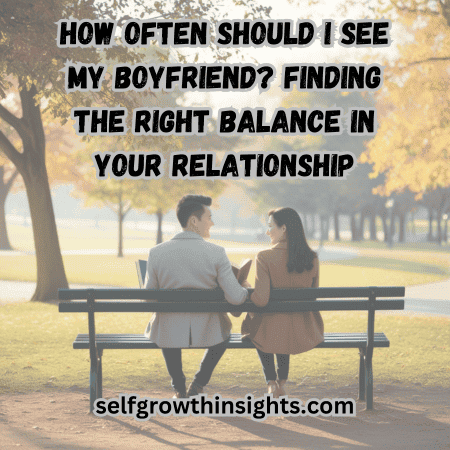The balance of a relationship is crucial, especially concerning the amount of time you will spend with your partner. Spending too much time with him could mean you lose the sense of your individuality. If you spend too little time together, you may feel disconnected. How do you get to that point where you are at your best? Let’s look into the factors that will determine how Often Should I See My Boyfriend? and the perfect way you can ensure that your relationship remains well-balanced and content.
Your Relationship Stage
The level of your relationship plays an important part in how frequently you’ll get to see each other. In the beginning, it’s common to feel overwhelmed with anticipation and eager to spend all the time you can. It’s normal. But as time passes forward, your habits will become more routine, as will your regular gatherings.
- Initial Stages of Dating In the beginning, when you’re beginning your journey, it’s normal to desire to be with your partner as frequently as you can. Every interaction is fresh, and each interaction is thrilling. Yet, sharing all at once could result in burnout or overwhelm So, be careful.
- established relationships If you’ve been with someone for a long time you’re likely to have an established routine. It’s possible to spend several evenings a week or perhaps live together. You must maintain an equilibrium between personal time and quality space.
- Long-term committed relationships If you’re in a committed relationship for the long haul and you’re in a relationship for a long time, it’s likely that you often, particularly in the case of living together. But it’s important to maintain the freshness of your relationship by taking advantage of the time you have together and not giving each other a second thought.
Individual Needs and Preferences
Each relationship is unique because everyone is unique. Knowing your partner’s specific needs will benefit both of you to create a schedule that works best for both of you.
- Introverts and Extroverts. Extroverts If you’re one of the more introverted, you could require more time alone to refresh. An extroverted, person, however, might thrive with regular interactions. Understanding and embracing these different personalities is essential to the overall health of your relationships.
- Balance between Independence and Togetherness Healthy relationships let you have both freedom and intimacy. It’s about having fun with your partner without losing sight of your desires and interests.
The Role of Communication
The ability to communicate is the mainstay of any healthy relationship. If you’re still not there talking to each other, it’s crucial to think about the amount of time you’d like to have with each other.
- Discussion of expectations Unbalanced expectations could cause anger. It’s possible to talk with the person five times a week and the guy is material with a few times. A clear and transparent discussion can help establish expectations for both sides.
- Averting miscommunications If you’re feeling that you’re not spending sufficient time with your partner (or excessively! ) Bring it to the table gently. Don’t let resentment fester when you assume your spouse knows your feelings.
Signs You Might Be Spending Too Much Time Together
There is a danger that excessive amounts of a positive relationship can be a bad thing! Too much time spent together could result in more damage than good.
- Persistent loss of personal identity If you are finding yourself sacrificing your activities, relationships, or time with yourself to be with your significant other, It could be the right time to reconsider your priorities.
- Not focusing on friendships and other relationships Relations thrive when they do not consume your whole existence. A support system outside of your relationship is beneficial and vital for balance.
Negative effects on personal growth and friendships
A major impact of this is slowed personal development. Friendships built on jealousy, and manipulative or competitive relationships create anxiety and create a situation where people find themselves being pressured to adhere to unacceptable norms or behavior and hinder their pursuit of their passions and interests genuinely. In time, this may lead to a loss of confidence in oneself and a lack of confidence that results in a lack of achievement in the goals of one’s own.
In addition, toxic friendships could negatively impact mental and emotional well-being by increasing anxiety and stress levels within individuals. If people are being influenced by negative factors, including toxic friends, they may retreat or adopt avoidance behaviors instead of making healthy connections, which can lead to an unending cycle of inability to build supportive relationships that hinders the development of resilience that is essential for personal development, which can lead to stagnation in their lives, and failure to make progress within their lives.
Signs You Might Not Be Spending Enough Time Together
However, being unable to see your partner sufficiently will also take the strain off the relationships.
- Emotional Separation If you’re spending weeks or days without speaking to your partner, you might begin to feel emotionally distant. Regular time spent together can help maintain the bonds between you.
- Long-Distance Problems For Couples who live in long distances, trying to remain emotionally connected even when physically separated is essential. Technology could benefit in bridging the gap however, regular visits are essential in maintaining the connection.
Balancing Time Between Personal Life and Relationship
Your love life is an integral part of your existence, but it shouldn’t dominate everything. Maintaining a healthy equilibrium between your private life and the romantic bond is essential to long-lasting satisfaction.
- Achieving personal goals It is important to keep your interests, job goals, and relationships. This will not only make you an overall better person, but it also keeps your relationships interesting and lively.
Quality Over Quantity: Making the Most of Your Time Together
If it’s about relationships, it’s not only about how frequently you interact with your partner, but the way you’re spending your time together.
- approach meaningful experiences Moving beyond relaxing on the sofa and watching television can be a huge impact. Strategy occasions or events which benefit people connect to a greater and deeper level.
- Be present Being present means engaging fully. If you’re engaged in conversations with your partner or enjoying a meal, being present will help connect more deeply.
Life Circumstances Affecting Time Together
The world is not always predictable; many variables could determine how frequently you meet your partner.
- Work schedules If one or both of you have a stressful work schedule, it may be difficult to find some time for you. It’s important to set priorities and also be open to change.
- School or college students’ examinations, classes, and tests are often overwhelming. It is important to be clear throughout these periods to control expectations.

How often should you see your long-distance partner?
Visits to each other within a long-distance relationship (LDR) will significantly affect the dynamic between couples, and the decision of how frequently to meet up requires an equilibrium of many aspects. In general, the best time to visit will be determined by the specific circumstances of both parties, which include work commitments as well as financial and personal commitments. In some cases, scheduling regular visits throughout the year could be feasible, which allows couples to enjoy spending time with each other while taking care of their lives. Other couples might find regular weekly visits, or smaller intervals of time, could benefit to maintain their relationship and enhance their bond by creating a feeling of connectedness that goes beyond physical distances.
Communication is an essential factor when it comes to establishing a pleasant scheduling of visits. Couples need to discuss their needs as well as their expectations with the frequency of visits and warrant that both parties have the same desire to make their relationship successful. In addition, discussing plans for the future and expectations could grant an understanding of the purpose and context of these meetings. If, for instance, couples share a goal of eventually closing the gap, regular visits could make sense, allowing them to keep the motivation going and maintain stability throughout their relationship.
The most important thing is the ability to be flexible and open. Every couple’s circumstances are unique in that while some prefer frequent contact with one another, others might find they grow closer in gaps between visits. Re-evaluating the schedule of visits regularly in the event of life changes can benefit each partner to feel valued and respected, which will ensure the relationship between them is happy and healthy.
Further Readings
- 5 Stepping Stones In A Relationship
- Signs Of A Male Empath- Misconceptions About Male Empaths
- How To Stop Obsessing Over A Lost Friendship – 7 Steps
Conclusion
The multifaceted nature of [topic/issue] underscores the importance of acknowledging that there isn’t a single, universally applicable solution. The diverse perspectives, contexts, and potential outcomes necessitate a nuanced approach, rather than a rigid, standardized response. Summing up, there’s no one-size-fits-all answer; instead, a successful resolution often hinges on careful consideration of individual circumstances and the tailoring of strategies to best address the specific needs at hand. This implies the need for ongoing evaluation, adaptation, and a willingness to explore a range of possibilities to achieve the desired results. Ultimately, the path forward requires a commitment to flexible thinking and a recognition that successful solutions are often found in the intricate interplay of various factors.
